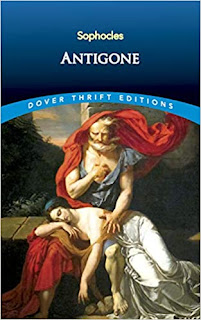Antigone, daughter of Oedipus, faces this dilemma in the play by Sophocles.
Her brothers Polynices and Eteocles kill each other in Polynices’ failed attempt to take over Thebes. Creon, their uncle, ascends to the throne and decrees that while Eteocles has a proper funeral because he defended Thebes, Polynices will be left in the open to be ravaged by wild dogs. Anyone attempting to mourn or bury this traitor will himself be killed. Antigone, obeying a divine law, buries her brother and incurs the wrath of Creon. She is sentenced to death.
While Antigone doesn’t worship a Christian God, she maintains that Creon is angering the gods Thebans do worship with his order. Even the pagan gods teach a divine law of right and wrong.
The prophet Tiresias also warns Creon that his arrogance and stubbornness will lead to disaster for him and his family. Indeed, his niece, his son, and his wife all commit suicide and Creon is left to live with the consequences of opposing divine law.
Sophocles wrote this play around 441 B.C., but the themes and truths make it timeless, a hallmark of great literature. What can we learn from this ancient story about decisions we face today? How do we render unto God things in His province while rendering unto Caesar the things of this world, especially when they seem to be at odds? Who will we worship and obey, God or Caesar?






No comments:
Post a Comment